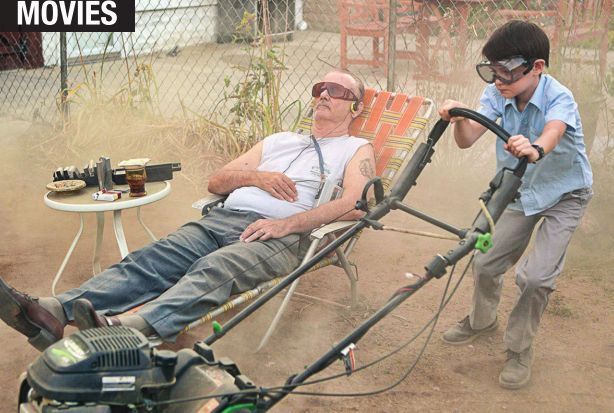
It’s all about Murray in St. Vincent
FILM | Chuck Koplinski
I’ve never been a member of the cult of Murray – Bill, that is. I know he has a very devoted following that thinks the sun rises and sets on his every move, marveling at the masterful way he underplays every scene using a sad-sack expression to convey complex emotions. For the most part, I see him playing the same role far too often, a situation that makes it hard for me to accept in lead roles. For my money, he’s far more effective in supporting parts, coming in to bolster a scene here or there, leaving the audience wanting more. (See Mad Dog and Glory, Wild Things and Get Low for great examples of how a little Murray can go a long way.)
His latest, St. Vincent, from first-time writer/director Theodore Melfi, is a showcase for Murray’s onscreen persona – that of the curmudgeon who doesn’t tolerate stupidity, can wither those he deems beneath him with an icy glance, has no problem unleashing a barbed, humorous quip when necessary and, of course, proves in the end to not be such a bad guy after all. The title character played by the veteran performer lives in a run-down house, is a constant drinker, has no luck at the horse track which he visits often and is in constant need of money. Something of a steady income develops for him when newly divorced Maggie (Melissa McCarthy) and her pre-teen son Oliver (Jaeden Lieberher) move in next door. Forced to work long hours, the beleaguered mom reluctantly allows Vincent to babysit her son after school and as a result, the young man’s education about the ways of the world begins.
I certainly can’t fault Melfi from using the premise of an older man taking a younger one under his wing in order to mentor him. It’s
been done so often that it’s passed from being a cliché to becoming a classic form. As it’s set up, much of this is played for humor and is very effective, as Vincent takes young Oliver to the race track, has no problem getting him to belly up to the bar at a neighborhood watering hole or teaching him how to present canned sardines as sushi. Also to Melfi’s credit is the fact that he never oversells these moments, letting the interaction between Murray and Lieberher convey the growing friendship between the two, resisting the temptation to lay things on too thick.
However, there are some gaping holes in the script that are too glaring to overlook. The fact that Vincent has money problems, the catalyst that brings him and Alexander together, is the cause of the difficulties he has with his bookie (Terrence Howard) and is a sticking point in providing long-term care for a loved one. Yet this problem is ignored during key moments in the third act as if it has been solved magically. This lack of narrative truth spills over into the subplot involving Vincent and his Russian, prostitute girlfriend Daka (Naomi Watts), who he’s gotten pregnant. These two together? Huh?
Of course, all roads lead back to Murray, and while he’s not required to break much of a sweat during the film’s first half, he stretches later on and is very effective. His brand of underplaying proves effective when he’s required to contend with the many problems that come Vincent’s way. It’s obvious that St. Vincent is nothing more than a piece of Oscar bait for Murray, but at the very least he rises to the occasion and delivers some poignant moments when it counts.
Contact Chuck Koplinski at [email protected].